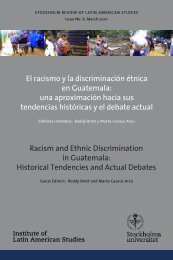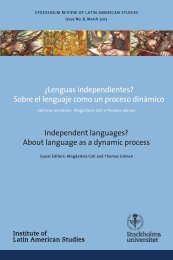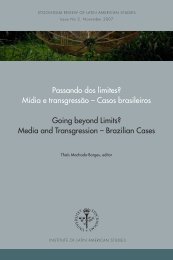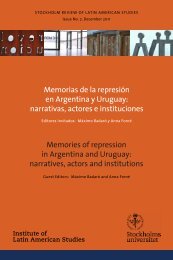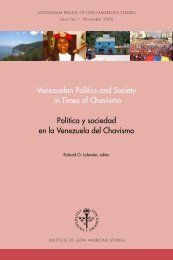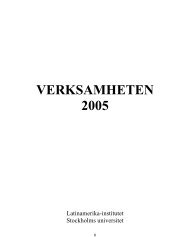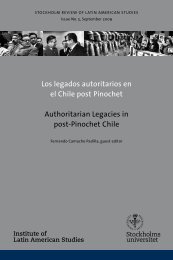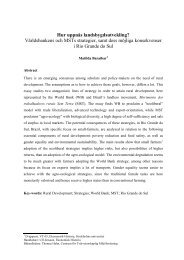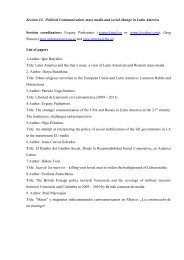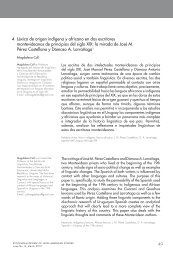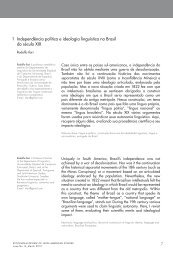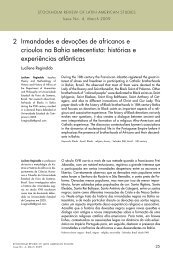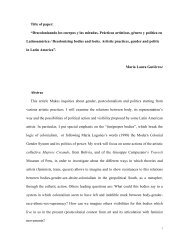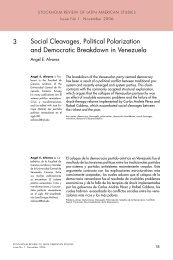Papers - Conference 2009 - Institute of Latin American Studies
Papers - Conference 2009 - Institute of Latin American Studies
Papers - Conference 2009 - Institute of Latin American Studies
Create successful ePaper yourself
Turn your PDF publications into a flip-book with our unique Google optimized e-Paper software.
Hence, the neo-liberal free trade approach has become a dominant discursive practice for howto achieve global economic progress in the world (see Bourdieu 1998 & 2002). Trade, then,“[…] not only shapes our economy but also determines the kind <strong>of</strong> world in which we live”(Moon 2008: 95). Due to the success <strong>of</strong> neo-liberalism in presenting itself as self-evident,there seems to be few – if any – alternatives to this consumption-driven world (Bourdieu1998: 29; Moon 2008: 111).MST and the age <strong>of</strong> Neo-liberalismEven though one may speak <strong>of</strong> today‟s world as a global consumption society, one should notforget that there is a large part <strong>of</strong> the world‟s population excluded from this society, trying toget by on only a few dollars a day (Moon 2008: 96). 6 Figures also show that inequalitieswithin and between societies have grown during the last 20-25 years (see Moon 2008: 96 andReeves & D‟Costa 2008: 141f). As demonstrated earlier, this trend can also be seen withinBrazil (see page 2, this paper). An increased concentration <strong>of</strong> landownership andimplementation <strong>of</strong> neoliberal policies has played an important and contributing part in this“development” (see Meszaros 2000: 3 and Karriem 2008: 6). 7The main objective <strong>of</strong> MST has since its early years been to obtain land for the landlesspeople, and the key actor necessary for this to be realized has been the Brazilian government.Yet, the state alone is not the only target for MST. The so called “supra-national institutions”,such as the IMF, WTO and World Bank, have also become major targets (Edelman 2005:337). João Pedro Stedile, economist and front figure <strong>of</strong> MST, argues that as long as the IMFcan continue to impose rules upon Brazil <strong>of</strong> how to spend its budget, not even Jesus Christhimself could change the situation <strong>of</strong> Brazil (Stedile 2004: 6f). Stedile argues that to get out <strong>of</strong>poverty – and thus, become empowered – it is not enough just to get a piece <strong>of</strong> land. Thefences that keep people <strong>of</strong>f the land are only one obstacle. Other disempowering fences are,according to Stedile, international capitalism and multinational corporations as well as lack <strong>of</strong>capital and knowledge (Stedile 2004: 15, 23 see also World Bank 2002). Hence, MST‟sstruggle for land reform is not only about land distribution, but rather a struggle for anextensive social change in which the access to land is but one important part. For suchstruggle to be successful “[…] political and structural barriers to change must be struck6 2,735 million people have together about 1.2 percent <strong>of</strong> the total global income, while 955 million people <strong>of</strong> the“high income countries” have 81 percent” (Pogge 2007: 207).7 For relevant figures, see Stedile 2004: 12.4



